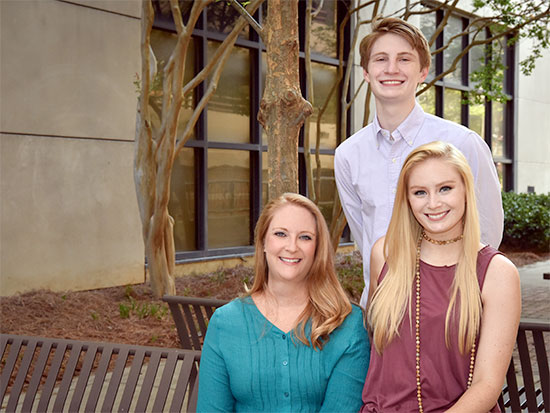 Ashley Hodges, left, is proud that her daughter, Amanda Segars, and son, Colton Segars, have chosen to follow in her footsteps and become nurses as well.
Ashley Hodges, left, is proud that her daughter, Amanda Segars, and son, Colton Segars, have chosen to follow in her footsteps and become nurses as well.
Written by: Laura Lesley
Ashley Hodges, Ph.D., has served in many leadership roles over the course of her 27-year nursing career. Her titles have ranged from staff nurse to charge nurse, instructor to associate professor, and committee member to board chair — to name a few.
Hodges’ current title, assistant dean for Graduate Clinical Programs in the University of Alabama at Birmingham School of Nursing, is one of her most expansive. She oversees both the Master of Science in Nursing and Doctor of Nursing Practice programs in the school, which account for more than 1,500 of its 2,000-plus students.
But to Hodges’ daughter Amanda Segars, R.N., “superhero” is a more fitting title.
Segars, a 2016 Bachelor of Science in Nursing graduate of the UAB School of Nursing who was also a member of the school’s Honors Program, works in the Neurosciences Intensive Care Unit at UAB Hospital.
“I love it,” she said of working in the high-acuity unit. “My mom really is my superhero. She always supported my journey to become a nurse and continuously encourages me to create my own career path.”
Hodges’ son, Colton Segars, is also pursuing a nursing career. He is a pre-nursing student at UAB and aspires to start nursing school in the fall of 2018.
“I’ve wanted to go into health care since I was a kid,” he said. “As I’ve grown older, I’ve seen the passion my mother and sister have for nursing. When I came to college, I decided to keep the family tradition going.”
Though Hodges and her children will all soon be working in the same profession, they all will be on different career trajectories.
“The beauty of nursing is that there is so much you can do,” Hodges said. “You can work in administration, informatics, anesthesia, education and so many other options.
“My daughter, Amanda, is a very different nurse than me in the way we approach the role. I enjoy primary care and sitting down with my patients, and women’s health is my passion. And I want to be vocal about health disparities in those areas. On the other hand, Amanda enjoys high-acuity, high-tech situations. My son, Colton, also realizes he can make his own pathway. Through Amanda, he has realized that he does not have to do what his mom does.”
Most importantly, Hodges says, they both realize the significance of caring for others.
| “True leaders identify people with individual strengths, and they are comfortable bringing in people who have different views. Bringing forth alternate ideas to make the process better is important for leadership.” |
“Even though it can be challenging, tiring and sometimes thankless,” she said, “they know it is truly a privilege to be in nursing.”
Hodges did not start her career to be a nationally known leader in nursing, and her current role as assistant dean for Graduate Clinical Programs is one she never envisioned as a new nurse. She just wanted to help people.
A turning point came six months after she became a nurse.
“Donna Purvis, one of my supervisors, asked if I would be interested in being a charge nurse,” Hodges said. “She saw something in me that I didn’t see in myself.”
She accepted the position, and soon her career began to take off, centering on administration and leadership.
“I became involved in the Association of Women’s Health, Obstetric and Neonatal Nurses in the late 1990s,” Hodges said. “Martha Lavender was the association’s president, and she also saw something in me and really pushed me to achieve my fullest potential.”
Lavender, a two-time UAB School of Nursing graduate and current president of Gadsden State Community College whom Hodges credits as having the biggest influence on her career, nominated her to serve on the conference planning committee for AWHONN’s annual national convention.
“With that, I realized that I could do work at the national level,” Hodges said. “Later, when I was called by the president of AWHONN to run for the national board of directors, I did — and I won my first election. Following that, I was asked to chair the national public policy committee and focus on advocacy for women’s health.”
Today Hodges is known nationally for her work in women’s health policy. She led the development of a position statement for AWHONN opposing laws and other reporting requirements resulting in incarceration or other punitive legal actions against women because of a substance abuse disorder in pregnancy.
“Leading the committee in writing and publishing this statement in one year and earning full support of the board were huge,” Hodges said.
Most importantly, Hodges credits many of her successes to her career mentors, and that gives her a focus for her work in the school and in local and national organizations.
“This is why I focus on mentoring people,” she said. “One of the most important parts of leadership is mentoring. A major part of the role is preparing for leadership succession. When the day comes for me to hang up my stethoscope, someone else will be ready to take what I have done and improve and grow the profession.
“True leaders identify people with individual strengths, and they are comfortable bringing in people who have different views. Bringing forth alternate ideas to make the process better is important for leadership.”